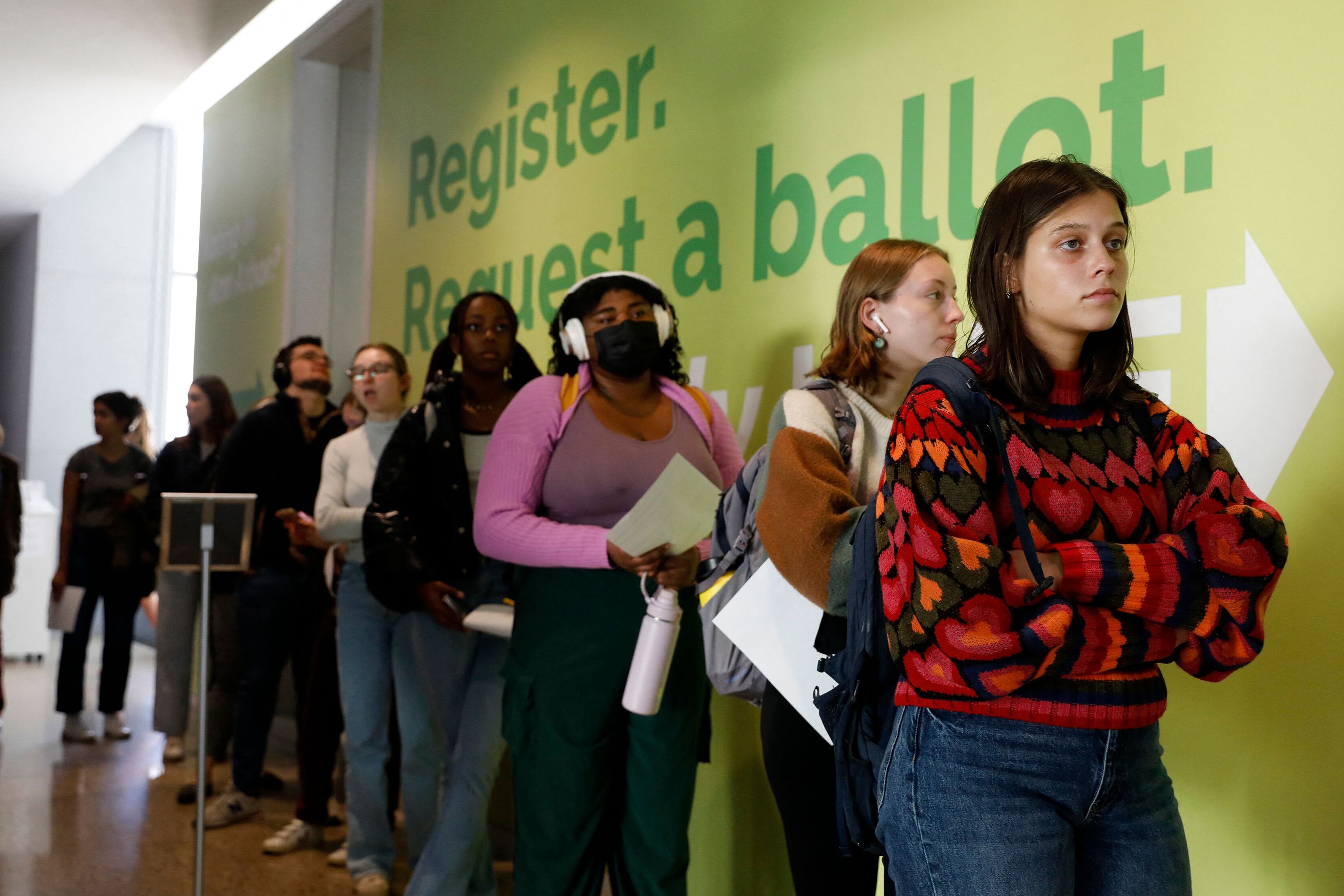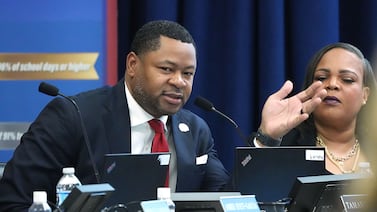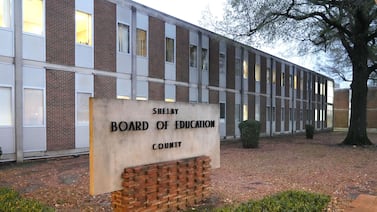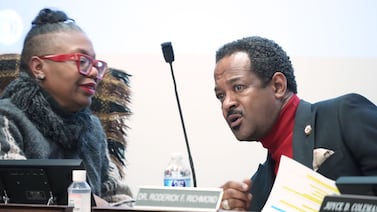Sign up for Chalkbeat Detroit’s free daily newsletter to keep up with the city’s public school system and Michigan education policy.
When you get to your polling place on Nov. 5 in Michigan, you will likely have a chance to vote for at least one person who will be tasked with setting the overall direction of your local school district.
School board members serve as a liaison between parents, students, the community, and their district. They have the power to make sure their constituents’ concerns are heard by school system officials, and they can hold top administrators accountable.
“They are the elected official who is closest to what our future is,” said Don Wotruba, executive director of the Michigan Association of School Boards. “Students who come out of our schools should be everyone’s interest.”
Though local school board members play a key role in the public education of communities, their elections often have low voter turnout.
“Every vote in a local school board election is incredibly powerful because so few people are voting in them,” said Lisette Partelow, a senior fellow at the Center for American Progress, a public policy and advocacy organization.
Turnout in school board races is sometimes as low as 5% to 10%, according to the National School Boards Association. In April in Newark, fewer than 2.8% of voters participated in the local school board election.
Because Michigan has elections in even years that include national and statewide races, more people go to the polls when there are school board races compared to other states where d elections for school board seats are held every year, said Sarah Reckhow, professor of political science at Michigan State University.
“There will be a lot of people voting this year, so we should have high voter turnout in these races,” she said. “But it’s a matter of folks taking the time to notice and think about what’s down ballot in local races.”
What is a local school board’s role in Michigan?
One of the most important roles of a school board is to hire their district’s superintendent. They may also vote to fire the school leader when they believe there is just cause.
“That’s a piece I think sometimes voters don’t understand,” said Wotruba. “If the community is unhappy with the direction of the district or if they think something has gone wrong, the board is capable of holding the superintendent accountable in those situations.”
Boards in Michigan also play a role in contract negotiations with teachers unions, so they have a say in educator pay.
While state lawmakers set state standards for what students learn, local boards are involved in deciding which specific curriculum districts will adopt.
With the passage of new laws that will change the way students are taught to read in Michigan, boards will vote to adopt curriculum changes to meet the new requirements to weave the “science of reading” into early literacy instruction.
Choosing quality literacy instruction in the coming years will be critical, given that the number of third graders who were proficient in reading and writing on the state’s standardized test results last year was lower than the previous 10 years.
School boards also work with district administrators to approve a balanced budget and vote on levying local taxes to help pay for it.
Board members cast votes on changes in district policy and contribute to developing new policies.
Boards help set long and short-term goals for the district, develop a structure to achieve them, and evaluate results.
Local boards in Michigan are also responsible for:
- Working to ensure the safety of students in the district
- Controlling the expenditure of school funds
- Acquiring contractors for district work
- Making decisions about facility needs, including capital improvement projects, and acquiring school property
- Deciding whether their district will provide transportation for students
Why should you vote in your local school board race?
Board members’ choices can make schools and educational outcomes more equitable, said Partelow.
School boards are tasked with drawing or redrawing attendance boundaries within districts, meaning they decide from which neighborhoods individual schools draw students.
This creates the potential for boards to deepen the racial segregation of schools within a district, or lessen it. Many districts in Michigan, including the Detroit Public Schools Community District, remain racially segregated 70 years after Brown v. Board of Education, the U.S. Supreme Court case that ended state-mandated racial segregation in schools.
All of the decisions boards make – on curricula, teacher pay scales, budget decisions, and which superintendent boards hire – all interact to make a district more or less equitable, said Partleow.
With low voter turnout, the votes cast in school board elections are not fully representative of the community the members represent.
Most people who vote in local school board elections don’t have children enrolled in public schools, a 2021 study published in the American Political Science Review found. The majority of the voters included in the study were white, which differed from the racial makeup of the students in the local districts. The study included districts in Illinois, California, North Carolina, and Oklahoma.
The study also found that the gaps in student achievement between white and non-white students were wider in districts “where the electorate looks dissimilar from the student population.”
Even those who don’t have school-aged children should recognize they have vested interest in which board members are elected to represent them in their districts, said Wotruba.
Access to quality public education has long been associated with better health outcomes, lower crime rates, and more economic success in communities.
Why don’t more people vote in school board elections?
A lack of media coverage of the local board races due to the limitations of shrinking newsrooms may contribute to the issue. That means voters must do their own research about where candidates stand on issues in their communities.
The races are nonpartisan in Michigan, meaning the ballots don’t show if candidates have party affiliations. This could contribute to why some voters don’t vote in the down-ballot races, said Partelow.
In recent years, however, as political polarization of social issues in schools has worsened, some candidates have begun campaigning with a party affiliation, or have been backed by political action committees, like the national right-wing organization Moms for Liberty, which signal their views on the issues.
More candidates across the country also have campaigned on culture war issues, such as removing books from school libraries that focus on race, racism or gender and sexuality, and that has drawn more national attention to school board meetings and races.
Conservative “parental rights” activists have largely failed to win board seats in Michigan. This may be one reason Michigan board races haven’t garnered the same amount of attention or news coverage as elections in other states, said Reckhow.
But, in suburban districts, Wotruba said he’s seen more candidates get endorsements from Democratic and Republican parties and PACs.
The Michigan Association of School Boards’ position is that the state’s school board races should remain nonpartisan.
“Because school boards really are about governing the school district rather than it is about representing a faction of the community, voters need to try to think of those positions as nonpartisan,” said Wotruba.
Correction Oct. 7, 2024: A previous version of this story misspelled Partelow’s name.
Hannah Dellinger covers K-12 education and state education policy for Chalkbeat Detroit. You can reach her at hdellinger@chalkbeat.org.






